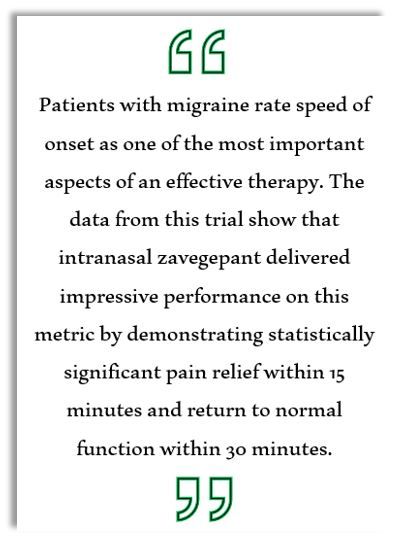- Clinical Technology
- Adult Immunization
- Hepatology
- Pediatric Immunization
- Screening
- Psychiatry
- Allergy
- Women's Health
- Cardiology
- Pediatrics
- Dermatology
- Endocrinology
- Pain Management
- Gastroenterology
- Infectious Disease
- Obesity Medicine
- Rheumatology
- Nephrology
- Neurology
- Pulmonology
Intranasal Zavegepant for Migraine Meets Coprimary Regulatory Endpoints in Pivotal Phase 3 Trial
Intranasal CGRP inhibitor zavegepant met coprimary regulatory endpoints in pivotal phase 3 trial in adults with migraine; FDA submission planned for Q1 2022.
Intranasal zavegepant, an investigational agent for the treatment of acute migraine in adults, met coprimary endpoints in a pivotal phase 3 clinical trial, demonstrating statistically significant superiority vs placebo on 15 prespecified outcome measures.
The results, reported on Monday by manufacturer Biohaven Pharmaceuticals, will be submitted to the US Food and Drug Administration as part of the company’s New Drug Application filing in the first quarter of 2022.
Zavegepant, a third generation, high affinity, selective and structurally unique, small molecule CGRP receptor antagonist, proved statistically superior to placebo on the study’s co-primary regulatory endpoints of freedom from pain (24% vs 15%, p <.001) and freedom from most bothersome symptom (40% vs 31%, p=.0012) at 2 hours. Importantly, twice the number of patients treated with 10 mg zavegepant experienced pain relief at 15 minutes after dosing vs those receiving placebo, also a statistically significant result.
Rapid onset critical

"Patients with migraine rate speed of onset as one of the most important aspects of an effective therapy,” observed Richard B. Lipton, MD, professor and vice chair of neurology at the Albert Einstein College of Medicine and director of the Montefiore Headache Center in a Biohaven press statement. “The data from this trial show that intranasal zavegepant delivered impressive performance on this metric by demonstrating statistically significant pain relief within 15 minutes and return to normal function within 30 minutes.”
The nonoral delivery route is an important benefit for some patients, he added, whose symptoms may include nausea, vomiting, or gastroparesis.
“Intranasal zavegepant will be an important new treatment option for patients who require a rapid and non-oral option for acute treatment of their migraine attacks," said Lipton.
The Phase 3 pivotal double-blind, placebo-controlled clinical trial randomized 1,405 adults to receive zavegepant 10 mg (n=623) or placebo (n=646). Criteria for inclusion were at least a 1-year history of migraine (with or without aura) and migraine attacks that, if left untreated, lasted an average of 4 to 72 hours. The study, conducted at 94 US sites, evaluated the safety and efficacy of zavegepant intranasal spray taken as needed in a single dose compared to placebo for the acute treatment of a moderate to severe migraine attack.
The study demonstrates “the potential of zavegepant to usher in a new era of non-oral CGRP targeting migraine therapies that may transcend the traditional boundaries of older legacy intranasal migraine approaches,” remarked Biohaven CEO Vlad Coric, MD, in the company statement. “Biohaven is committed to delivering on its promise to provide new treatment options for the millions of people living with this debilitating disease and these data represent a major milestone in that endeavor."
Safety, tolerability, AEs
Safety and tolerability of zavegepant were favorable with profiles consistent with previous clinical trials. Abnormal taste was the most common individual adverse event (AE) reported with a frequency ≥5% in the zavegepant treatment arm and greater than placebo (21% vs 5%). The majority of AEs were reported as mild.
intranasal zavegepant safety and efficacy were previously shown in randomized controlled phase 2/3 dose-ranging trial with >1000 patients treated. Zavegepant in that trial also was statistically superior to placebo on comprimary endpoints.
